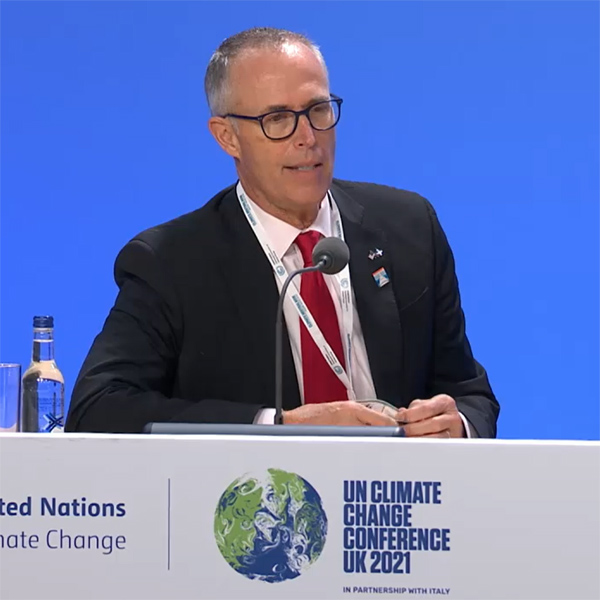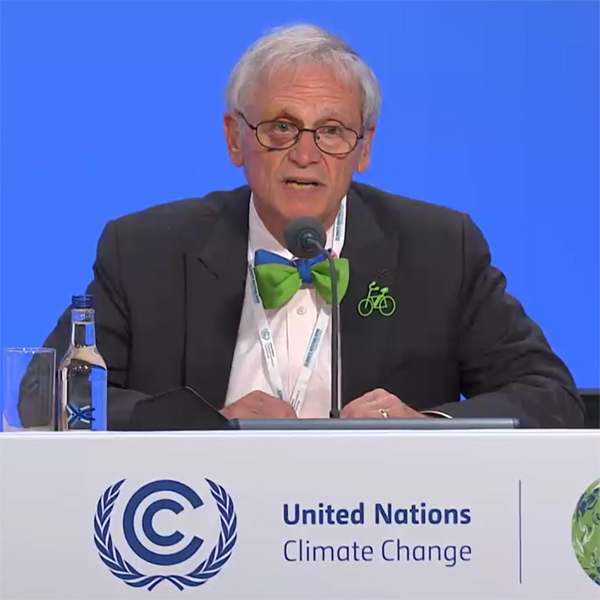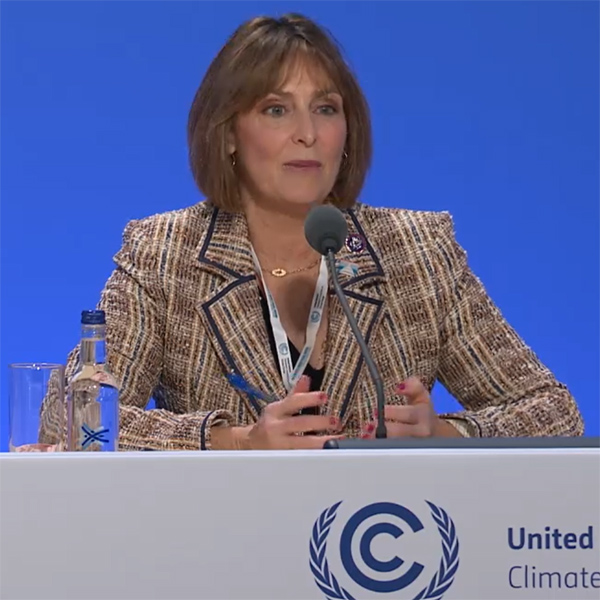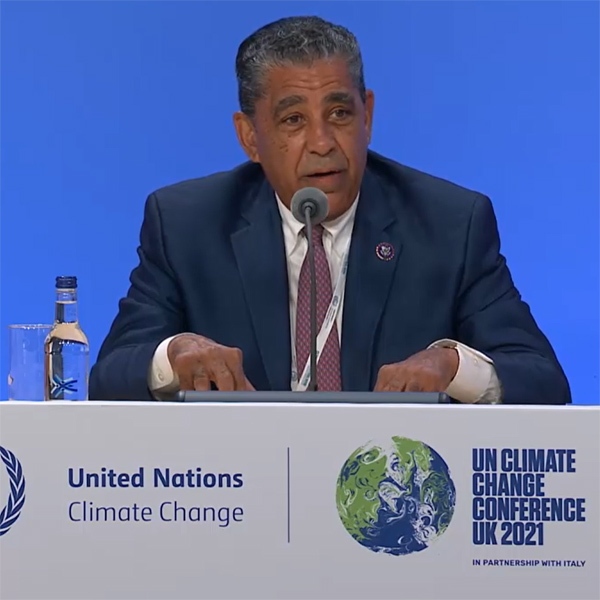A delegation of Democratic lawmakers at the UN Conference on Climate Change (COP26) faced tough questions on Wednesday about the United States’ global and moral leadership on climate action, beginning with the country’s failure to join more than 40 other nations in a pledge to end unabated coal-fired generation in the 2030s.
“You’re right; we are not there yet,” said Rep. Jared Huffman (D-Calif.), speaking at a press conference called by House Speaker Nancy Pelosi (D-Calif.). “We have disconnects. … There were political restraints and realities we’re still trying to navigate. And you can point to contradictions and inconsistencies and inadequacies and all of that. But I hope what you hear is a resolve to step up and do everything that we possibly can, and we will get there.”
 Rep. Jared Huffman (D-Calif.) | UN Climate Change Conference UK 2021
Rep. Jared Huffman (D-Calif.) | UN Climate Change Conference UK 2021Setting the stage for the battles ahead as Democrats return to the Capitol next week with the goal of passing the $1.75-trillion budget reconciliation package, Huffman, Pelosi and other Democrats at the event emphasized both their determination to act and the need to navigate political realities in a closely divided Congress.
“Congress is here to demonstrate that we are doing our part to ensure that President Biden is successful when he sets a new goal of reducing pollution in the United States and our emissions by 50 to 52% by 2030, and then getting to net zero no later than 2050,” said Rep. Kathy Castor (D-Fla.), chair of the House Select Committee on the Climate Crisis.
“We are investing unprecedented sums of money to be able to follow through on American commitments,” said Rep. Earl Blumenauer (D-Ore.). “We’ll duke out certain things in the long run. The coal industry is dying in the United States, not because necessarily of the regulations which [former President] Donald Trump unwound, but because of economics.”
 Rep. Earl Blumenauer (D-Ore.) | UN Climate Change Conference UK 2021
Rep. Earl Blumenauer (D-Ore.) | UN Climate Change Conference UK 2021Pointing to incentives such as the 10-year investment tax credits for a range of renewables in the budget package, Blumenauer called the switch to clean energy “the rational decision that business and communities are making. So, we’re going to pursue long-term policy changes, but in the short-term, we are putting money behind investments of our government and what we’ve seen from the private sector. Those are incontrovertible, and that’s where we are headed.”
Another question challenged Pelosi on the Democrats’ failure to keep provisions in the budget bill that would have ended a range of tax subsidies for fossil fuel producers — despite a long-standing G-7 pledge to end such incentives by 2025.
“I’ve been trying to get rid of those subsidies for as long as I have been in a position to do so,” Pelosi said. “Some of the leading fossil fuel companies … make a trillion dollars a year; they need no incentive to drill.”
 Rep. Kathy Castor (D-Fla.) | UN Climate Change Conference UK 2021
Rep. Kathy Castor (D-Fla.) | UN Climate Change Conference UK 2021But given strong support for such subsidies even by some Democrats, such as Sen. Joe Manchin (W. Va.), Pelosi said the way forward is to stay focused on Biden’s goal of a 50-52% reduction in carbon emissions by 2030. “We have a goal; we have a timetable; we have milestones,” she said. “That is what we will do, and that’s what our legislation enables us to do to reach the president’s goals, our goals.”
Castor argued that funding in the budget bill — officially, the Build Back Better Act — will provide “different pathways” to cut carbon emissions, such as a $29 billion fund to help nonprofit and state finance institutions to fund rapid deployment of low- and zero-carbon technologies. At least 40% of those investments will go to low-income and disadvantaged communities, she said.
“We wish we could be part of the end of coal and that pledge,” Huffman said. “But instead of just throwing up our hands because of these political roadblocks and not taking action, we are finding ways to navigate those problems and still take action.”
‘Unabated Coal’
Efforts to phase out coal by the 2030s are clearly a flashpoint in Congress, but while the U.S. did not sign the international pledge, both Hawaii and Oregon did, along with two utilities, National Grid and Public Service Enterprise Group (PSEG). Based in New Jersey, PSEG recently upped its target for reaching net-zero emissions to 2030, and in August announced the sale of all its fossil fuel generation plants.
The pledge calls for “a transition away from unabated coal power generation in the 2030s (or as soon as possible thereafter) for major economies and in the 2040s (or as soon as possible thereafter) globally.”
In an interview with Bloomberg News on Tuesday, Special Presidential Envoy on Climate John Kerry appeared to signal support for the pledge by predicting the U.S. would be able to phase out coal by 2030. As reported by Bloomberg and other national media, Kerry said, “By 2030 in the United States, we won’t have coal. We will not have coal plants.
“We’re saying we are going to be carbon-free in the power sector by 2035,” Kerry said. “I think that’s leadership. I think that’s indicative of what we can do.”
Rep. David McKinley (R-W. Va.), a member of the House Energy and Commerce Committee, quickly took to Twitter to criticize the “elitist John Kerry” and the Biden administration for not caring about coal workers or their families.
“West Virginia wants to know, Mr. Kerry, how do you expect to tell these folks they don’t have a job anymore?” McKinley wrote.
But the pledge’s reference to “unabated coal” provides some negotiating space for fossil fuel producers and coal-dependent industries, both of which have been lobbying hard for funding to support the development and deployment of carbon capture and sequestration technology. The bipartisan infrastructure bill includes more than $300 million through 2026 for grants to carbon-utilization projects, and another $100 million in the same time frame to support the design and development of carbon transport systems.
The budget reconciliation bill also includes a generous tax credit for industrial carbon-capture.
Climate Finance
Another tough question hit on whether the U.S. and other major economies will deliver on providing $100 billion a year in financing to help emerging economies and climate-vulnerable island nations to transition to clean energy. The $100-billion commitment was part of the 2015 Paris climate agreement but has yet to be reached.
 Rep. Adriano Espaillat (D-NY) | UN Climate Change Conference UK 2021
Rep. Adriano Espaillat (D-NY) | UN Climate Change Conference UK 2021Speaking at the World Leaders Summit on Nov. 1, Biden pledged to work with Congress to raise the U.S. contribution to $3 billion per year. (See World Leaders at COP26: Climate Action Now.)
While not committing to any figure, Castor said, “What we’d like to do [is] have U.S. agencies working with development partners, prioritizing climate in public investments, enhance technical assistance and long-term capacity, align support with country needs and priorities, and boost investments in adaptation and resilience.”
She cited the U.S. Agency for International Development’s (USAID) new climate strategy, which commits to mobilizing $150 billion in public and private finance by 2030.
Rep. Adriano Espaillat (D-N.Y.) underlined the importance of “connecting the dots” between the nations and communities around the world being devastated by climate change and “how the discussion here impacts back home.”
“How does it impact that child who suffers from asthma? How does it impact that home that’s flooded every time it rains? How does it impact the quality of life in the districts we represent?” Espaillat said. “So, we’ve tried to find the collective will to not only enact public policy, but also to find financing to address these issues globally.”




